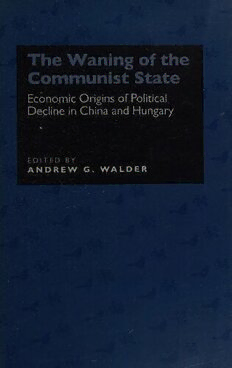
The Waning of the Communist State: Economic Origins of Political Decline in China and Hungary PDF
304 Pages·1995·17.241 MB·English
Most books are stored in the elastic cloud where traffic is expensive. For this reason, we have a limit on daily download.
Preview The Waning of the Communist State: Economic Origins of Political Decline in China and Hungary
Description:
This collection of essays offers a compelling explanation for the decline of communism in the two countries that went the furthest with economic reformsChina and Hungary. Articulating a vision of change that serves as a counterpoint to the prevailing emphasis on citizen resistance and protest, the contributors focus instead on the declining organizational integrity of the centralized party-state. The essays illuminate a "quiet revolution from within" that beset the two regimes after they chose to reform their economies and make concessions to the private sector.The nine contributors, three each from the disciplines of sociology, political science, and anthropology, examine key trends that appeared in both countries. The chapters trace political consequences of economic reform that range from the decline of the central state's fiscal dominance to the revitalization of long-suppressed ethnic loyalties.
See more
The list of books you might like
Most books are stored in the elastic cloud where traffic is expensive. For this reason, we have a limit on daily download.
